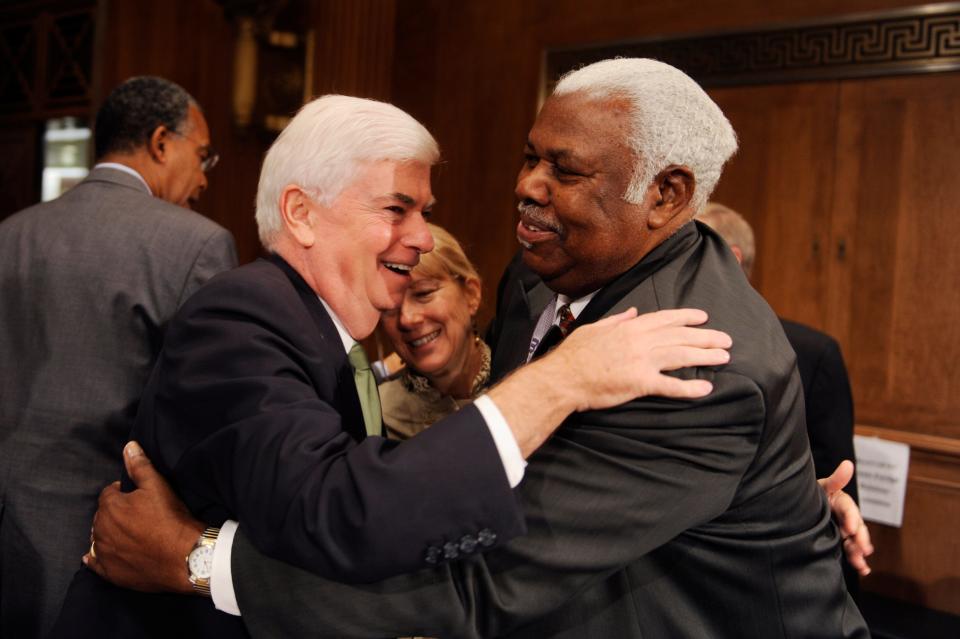Bertie Bowman ran away from home at 13 to sweep the steps of Capitol Hill. He died at 92 as the the longest-serving African-American Congressional staffer.
Herbert "Bertie" Bowman was the longest-serving African-American staffer on Capitol Hill in US history.
He died on October 25 after a nearly 60-year career in the Senate.
Bowman first arrived in Washington, DC, in 1944 as a runaway and worked as a sweeper on the Capitol's steps.
Bertie Bowman, the longest-serving African-American staffer on Capitol Hill in history, died at 92 years old on Wednesday morning.
Andrew Desiderio, a reporter for Punchbowl News, first reported that Bowman's death was announced by Sen. Ben Cardin of Maryland during a Senate Foreign Relations Committee meeting on Wednesday. A spokesperson for the committee confirmed the news.
Herbert "Bertie" Bowman was born in Summerton, a small town in South Carolina, in 1931. Like many families during the Great Depression, the Bowmans struggled financially. Bowman recalled in his memoir "Step by Step" that "the wind would whistle through the wooden boards of the house" in the winter.
The 14 Bowman children worked on their family's farm, waking up before dawn every day to complete morning chores before walking three miles to school. "The white children, in buses, passed us on the road to their well-equipped classrooms and modern textbooks," Bowman wrote.
A chance encounter with a senator
Bowman dreamed of escaping the grueling life on the farm and his father's rule of law. He saw a glimmer of possibility in 1944 when he met a senator from South Carolina, Burnet Maybank, who invited crowds gathered at a local store to "drop by" and see him if they were ever in Washington, DC.
Then-13-year-old Bowman approached Maybank as the senator was about to get into his car and asked if he was also invited to visit his office.
"The senator leaned over and replied graciously, 'Certainly, my boy,'" Bowman recalled.
The idea of leaving Summerton and "going up the road" became Bowman's obsession, and he began to plan his exit.

From janitor to congressional staffer
Several nights later, Bowman crept out of the house with one sack of flour and his meager savings pinned to his shirt, and boarded a train to Washington. He was immediately entranced by the nation's capitol.
"When I got to the Union Station, man, I thought that Union Station was Washington. All those lights. I'd never seen that many lights before," Bowman told talkshow host Tavis Smiley in 2008.
Bowman managed to track down Maybank, who helped him secure a place to stay and a job sweeping the Capitol steps for $2 a week.
Bowman swiftly established himself as a jack-of-all-trades and eventually became a janitor for the Capitol. During that time, he formed relationships with influential members of the government, including future President Lyndon Johnson.
Bowman's close relationships with white politicians — even those who had publicly supported segregation — became an unusual aspect of his career. Bowman called Strom Thurmond a good friend, and repeatedly drew distinctions between the personality and the public positions taken by the former governor of South Carolina who was known to be a staunch segregationist.

Bowman was also friendly with Sen. Jesse Helms of North Carolina, and Sen. J. William Fulbright of Arkansas, both of whom also supported segregation.
"We never did discuss things like that," Bowman told Roll Call in 2013. "They were my friends."
In 1965, Bowman became a clerk for the US Senate's Foreign Relations Committee, where he worked on some of the nation's most monumental issues, like the Vietnam War and the Watergate scandal.
During this time, he also supervised a young Bill Clinton, who, at the age of 21, served as a messenger for the committee. In a 2008 essay for the Washingtonian, Bowman wrote about how the two of them bonded over their shared love of Elvis.
Years later, former President Clinton penned the foreword to Bowman's memoir, writing, "Bertie's life is a testament to the power and promise of the American Dream."

A lifetime of service at the Capitol
By the time Bowman retired in 1990, he had risen the ranks to become the Foreign Relations Committee's assistant hearing coordinator — a significant role that handled logistics for all of the committee's meetings throughout the year.
Although he'd retired, Bowman continued to serve as a consultant for the committee for the next decade.

In 1999, Sen. Helms, who had just become chair of the Foreign Relations Committee, sought Bowman out to come out of retirement and serve as his hearing coordinator.
Bowman had continued to work in the Capitol until his death, becoming the longest-serving African-American congressional staffer in US history.
"For 57 years — 57 years! — if you served on or appeared in front of the Senate Foreign Relations Committee, you knew the big smile, the booming laugh, and the bear hug of Bertie Bowman," John Kerry wrote in a tweet on Wednesday. "His title may have been 'hearing coordinator' but it could've just as easily been 'heart and soul.'"
"Bertie was an institution — an inspiration of a man who started in the Senate sweeping floors at 13 and made the place both his career and his home — but more than that, he was a great human and I'll miss him," Kerry said.
Read the original article on Business Insider

 Yahoo News
Yahoo News 
